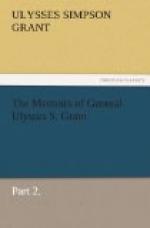During all of the trying winter of 1860-1, when the Southerners were so defiant that they would not allow within their borders the expression of a sentiment hostile to their views, it was a brave man indeed who could stand up and proclaim his loyalty to the Union. On the other hand men at the North—prominent men—proclaimed that the government had no power to coerce the South into submission to the laws of the land; that if the North undertook to raise armies to go south, these armies would have to march over the dead bodies of the speakers. A portion of the press of the North was constantly proclaiming similar views. When the time arrived for the President-elect to go to the capital of the Nation to be sworn into office, it was deemed unsafe for him to travel, not only as a President-elect, but as any private citizen should be allowed to do. Instead of going in a special car, receiving the good wishes of his constituents at all the stations along the road, he was obliged to stop on the way and to be smuggled into the capital. He disappeared from public view on his journey, and the next the country knew, his arrival was announced at the capital. There is little doubt that he would have been assassinated if he had attempted to travel openly throughout his journey.
CHAPTER XVII.
Outbreak of the rebellion—presiding at A Union meeting—mustering officer of state troops—Lyon at camp Jackson—services tendered to the government.
The 4th of March, 1861, came, and Abraham Lincoln was sworn to maintain the Union against all its enemies. The secession of one State after another followed, until eleven had gone out. On the 11th of April Fort Sumter, a National fort in the harbor of Charleston, South Carolina, was fired upon by the Southerners and a few days after was captured. The Confederates proclaimed themselves aliens, and thereby debarred themselves of all right to claim protection under the Constitution of the United States. We did not admit the fact that they were aliens, but all the same, they debarred themselves of the right to expect better treatment than people of any other foreign state who make war upon an independent nation. Upon the firing on Sumter President Lincoln issued his first call for troops and soon after a proclamation convening Congress in extra session. The call was for 75,000 volunteers for ninety days’ service. If the shot fired at Fort Sumter “was heard around the world,” the call of the President for 75,000 men was heard throughout the Northern States. There was not a state in the North of a million of inhabitants that would not have furnished the entire number faster than arms could have been supplied to them, if it had been necessary.




